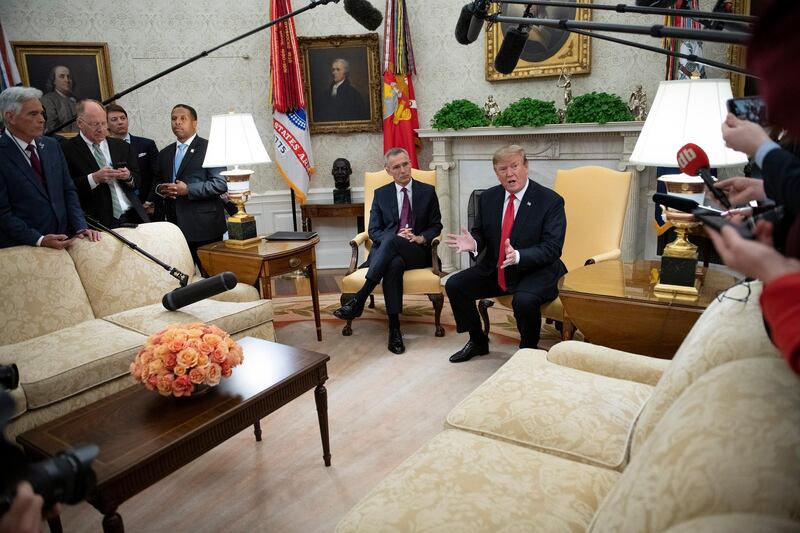After the major contribution the Nato alliance has made to guaranteeing the security of Europe and the wider world, it is somewhat surprising that this week's events to mark the 70th anniversary of the organisation's foundation, which are taking place in Washington, should be such a subdued affair.
It is mainly due, after all, to the resilience the Nato alliance demonstrated during the Cold War that the Soviet Union – the main threat to the freedoms enjoyed by the Western democracies – collapsed in chaos 1989, thereby freeing the peoples of eastern Europe who had lived under the Soviet yoke since the end of the Second World War.
Moreover, Nato continued to demonstrate its relevance in the post-Cold War era by the way it responded to Al Qaeda’s devastating September 11 attacks on New York City in 2001. In the immediate aftermath of the attacks, Nato member states invoked Article 5, the mutual defence clause in the 1949 Nato treaty that stipulates that an attack on any Nato country represents an attack on the entire alliance.
One of the major consequences of this action was the establishment of the Nato-authorised military intervention in Afghanistan, which, while it encountered significant difficulties and setbacks, nevertheless succeeded in establishing a system of democratic government in that benighted country.
Today the Nato alliance faces a new range of challenges, which make its continued existence just as vital to safeguarding the interests of the free world as it did at its inception 70 years ago.
While the threat posed by Islamist terror organisations such as Al Qaeda and ISIS retain some of their potency, these days Nato’s war-planners find themselves more preoccupied with working out how to deal with arguably more dangerous issues, such as the resurgence of Russian militarism under President Vladimir Putin and the emergence of China as a global superpower.
And yet, at a time when countries on both sides of the Atlantic should be celebrating Nato’s key role in guaranteeing the security of the world’s leading democracies, this week’s celebrations in Washington are somewhat muted.
It was not supposed to be like this. The original plan was to arrange a summit of the 29 leaders of the transatlantic alliance to Washington to celebrate Nato’s achievements, as well as giving some serious thought as to how the organisation might adapt to face future problems.
The celebrations were scaled down owing to concerns that President Donald Trump might, as has been his custom, hijack the summit and use it as a platform to renew his attack on European allies such as Germany, which he has accused of not paying its fair share in terms of defence spending.
Now, this week’s summit is only being attended by Nato foreign ministers, with US Secretary of State Mike Pompeo presiding over the proceedings in place of Mr Trump. Nato officials remain hopeful that the major summit planned to take place in London at the end of the year might provide a more fitting stage for a proper celebration of its achievements.
The fact, though, that this week’s events have had to be scaled down is an indicator of the very real challenges the alliance faces from within its own ranks, challenges that raise some very real questions about whether it will be able to continue in its present incarnation in the decades to come.
Perhaps the most concerning development the alliance has faced in recent years is the election of an American president who openly questions whether Washington should continue to play the dominant role in Nato. The US has enjoyed this position since the ceremony marking the formation of the alliance on April 4, 1949, at which President Harry Truman declared the organisation’s goal should be to act as “a shield against aggression”.
Mr Trump’s main complaint is that too many member states fail to spend 2 per cent of their GDP on defence, the minimum Nato requirement. Only five European countries, including Britain and France, meet this target. By contrast Germany, which enjoys a massive budget surplus, only spends 1.2 percent.
This has prompted Mr Trump – with some justification – to question why it is that American taxpayers should contribute the lion’s share of Nato’s defence requirements when the main purpose of the organisation is to guarantee the security of its European member states.
Mr Trump’s constant barrage of criticism aimed at European politicians such at the German chancellor Angela Merkel has even raised fears that he might unilaterally withdraw American forces from the alliance altogether, leaving the ill-prepared Europeans to defend themselves.
This concern is being taken seriously in some European capitals, so much so that politicians in Berlin and Paris have revived plans to establish an independent European Defence Force.
The idea of creating such an entity is nothing new, and has been mooted on several occasions in the past, in the context of forging closer European integration within the EU.
But critics of the concept argue that, while encouraging the Europeans to take more seriously issues concerning their own defence, setting up a new defence structure to rival Nato would simply divert vital resources away from the far more pressing business of protecting the Western alliance.
At a time when the transatlantic alliance is having to contend with an array of new and complex threats, Nato cannot afford the luxury of member states indulging in disputes over its future membership and structure.
On the contrary, Nato’s priority should be to ensure it has the funding and political backing necessary to develop the modern defence capabilities it will need to tackle the challenges of the decades to come.
Con Coughlin is the Daily Telegraph’s defence and foreign affairs editor





